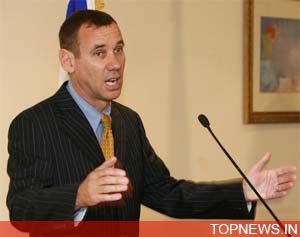Israel welcomes truce proposal, keeps up Gaza attacks
 Tel Aviv/Gaza - Israel welcomed Wednesday a Franco-Egyptian proposal to end 12 days of fighting in the Gaza Strip that has killed hundreds and injured thousands, but continued to attack the enclave.
Tel Aviv/Gaza - Israel welcomed Wednesday a Franco-Egyptian proposal to end 12 days of fighting in the Gaza Strip that has killed hundreds and injured thousands, but continued to attack the enclave.
"Israel welcomes the (Franco-Egyptian) initiative and is working on it and is interested in its success," government spokesman Mark Regev said.
Israel insisted on a halt to all rockets launched by Hamas from the Gaza Strip and a weapons embargo to be imposed on the Islamist movement, he said.
Israel would send a senior defence official, Amos Gilad, to Cairo on Thursday to discuss the possible ceasefire, local media reported.
Hamas politburo member Mussa Abu Marzuk told al-Arabiya TV it would "respect and consider any proposal that calls for ending the (Israeli) aggression and for the withdrawal of the (Israeli) Army."
Hamas also opposed any possibility of international troops coming to the Gaza Strip to reinforce a truce, he said. Germany has expressed its willingness to send troops, if either side wanted such a force.
"In the light of all the diplomatic efforts ongoing right now, I am convinced we will succeed in finding a formula agreeable to both sides within 48 hours," Ahmed Yousef, a senior Hamas political figure in Gaza, was quoted as saying by the Israeli Ynet website.
But on Wednesday evening, the Israeli Airforce dropped more than 100,000 leaflets over Rafah in the southern Gaza Strip, telling residents to leave the area until the next morning, witnesses and the military said.
Thousands fled parts of the city closer to the Egyptian border, where many smuggling tunnels are located, and some were seeking refuge at United Nations schools.
Medical sources in Gaza said the Palestinian death toll in Operation Cast Lead stood at 702 people and estimated that half of those killed were women and children. More than 3,100 people were injured.
Earlier Wednesday, Israel initiated a three-hour lull in the fighting in Gaza to allow Palestinians living there to stock up on necessities. The United Nations said fuel and wheat remained priority items that it needed to import to Gaza.
An Israeli military spokeswoman said she did not know of any rockets fired during the ceasefire.
Acting Prime Minister Ehud Olmert ordered a humanitarian corridor be set up in the Strip to allow necessary provisions to reach Palestinians who have been cut off by the fighting.
Defence Ministry spokesman Peter Lerner said Israel allowed in 80 trucks of aid and that there would be a three-hour pause in the fighting every second day.
"A three-hour pause is not enough - we need a permanent ceasefire," Chris Gunness, the spokesman for UNRWA, the UN agency aiding Palestinian refugees, told Deutsche Presse-Agentur dpa.
The fighting resumed as the three-hour deadline expired, with Palestinian militants firing more rockets and Israel continuing with its airstrikes.
The strikes continued throughout the Gaza Strip late Wednesday and a mosque in Gaza City was bombed, a witness said. An Israeli military spokeswoman said the planes were targeting tunnels and homes used for stockpiling weapons, particularly in Rafah.
"There is no safe space in the Gaza Strip - no safe haven, no bomb shelters and the borders are closed making this one of the rare conflicts where civilians have no place to flee," Maxwell Gaylord, the UN's humanitarian coordinator in Jerusalem, said in a statement.
Israel began bombing the Gaza Strip on December 27, in response to massive rocket barrages from the salient on its southern towns and villages following the end of a truce on December 19.
On Saturday evening, the Army was ordered into the Strip, which has since seen heavy ground fighting.
The Israeli Cabinet met Wednesday but reached no conclusion regarding the ground operation, saying only that it viewed the ceasefire proposal "favourably." (dpa)